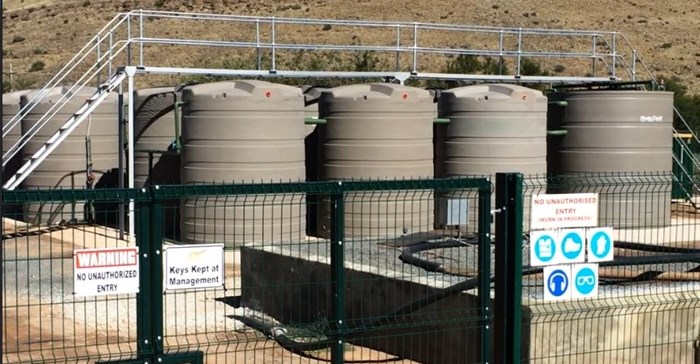
Although the company is also busy with the organic clean-up of the city’s polluted North End Lake, with this new project they are piloting an organic solution for ridding abattoirs of animal waste which, in the process, both saves and creates wash water.
The severe drought throughout South Africa has seen the country’s 460 red meat abattoirs inundated with animals for the slaughter as farmers battle water shortages. The severe water shortages have put red meat abattoirs under pressure in terms of the stringent standards for cleanliness and waste disposal laid down by the Meat Safety Act and individual municipal by-laws for waste water management.
Red Meat Abattoir Association spokesman Dr Gerhard Neethling said the more effective use of water and the re-use of grey water had become a priority for the industry.
Neethling said the methods of waste disposal approved by the red meat regulations were not deemed acceptable according to newer waste management regulations and guidelines provided by the national Department of Environmental Affairs. “There have been challenges with regards to implementation,” said Neethling. “The association is currently engaging with the department to investigate and approve alternative options for the industry.”
Rhino Water’s new waste treatment solution, in partnership with organic solutions company Blue Planet South Africa, sees organic waste treatment plants set up on site, geared specifically to the red meat and poultry industry.
According to Rhino Water’s managing director Sarel Bam, few abattoirs were able to comply with current regulations when it came to slaughter waste with many incurring penalties for effluent ending up in sewers or dumped in the bush. “We have brought a unique, organic solution to SA which consists of a packaged plant to treat blood, organic waste and grey and black water to municipal discharge and irrigation standards. A by-product of this process is wash water.”
Bam said abattoirs required specific technologies to treat a wide range of waste categories unique to the industry. “Challenges include high levels of ammonia, iron, nitrates and coliforms in the waste water, as well as the slow decomposition rate of animal waste,” said Bam.
He said the plant itself was modular in design, with components pre-manufactured for easy installation. The added benefit of the on-site packaged plant was that wash water could be extracted from the treated animal waste and used for washing floors and other on-site cleansing requirements.
Partnering with environmental company Cool Technology, which was responsible for the treatment plant design, has given Rhino Water access to the imported BluePlanet range of AquaClean bacterial products. Cool Technology has since become a 50 percent shareholder in the newly established BluePlanet South Africa, which holds sole import rights for Southern Africa.
Blue Planet technical applications manager Charlie Hopkins said the product was imported from the USA and had been used successfully in more than 60 countries worldwide. Among its successes, said Hopkins, was the treatment of industrial waste water from a local cheese manufacturing plant. “They have to dump whey that doesn’t meet the requirements to process into cheese. It’s really bad stuff but adding extra bacteria fixes the problem – it’s very much a hands-on process that is managed and monitored.”
Hopkins said Blue Planet SA would start to manufacture the product locally in the second half of the year to ensure that pricing was not dependent on exchange rate fluctuations and that continuous supply could be guaranteed.